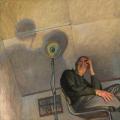 George Grant has been a hero of mine since I was first introduced to him through my High School Latin teacher. Mr. Wilson photocopied a CBC Ideas transcript for me, and I found his ideas about technology, the enlightenment period, and the role of the love of goodness very intriguing. What Grant had to say about Simone Weil, Nietzsche and Heidegger fascinated me, too, but I didn't know what he was really talking about back then. Yet when I went on to study classical philosophy (that is, the pre-socratics, Plato and Aristotle) as part of my undergraduate degree, I found myself often going back to find out what George Grant had to say about certain ideas and the classical thinkers and their relationship to this post-enlightenment world. So often I found his views to dovetail with my own that I thought there was some sort of mental tie. Though Grant dabbled in the subtle platonic theory about forms and the ontological basis for them in the idea of the good, the most profound thing he ever wrote was at the end of Lament For A Nation, where Grant wrote about a notion that is near to my heart: the relation between the certainty of the saint and the hopeless, despairing unbeliever to a regular, wanna-be-manly chap like myself. Now men who truly despair don't write poetry, plays or novels; suicide is the act of a man who has no hope. Such is the despondent extreme when viewed unromantically. Few see no hope at all; but, once again, few ever attain the certainty of the holy. They are rare who greet all horrific events and losses of good with the cheerful knowledge that all changes in the world take place within an eternal order that is not affected by them. Somewhere in between these two poles are the vast majority. Accordingly to Grant, "if one cannot be sure about the answer to the most important questions, then tradition is the best basis for the practical life." Such is one of the fundamental precepts that I live by, and though it is a simple idea it is profound and rich. For it allows a man like myself to live with courage in the ancient faith that asserts whatever impersonal ferocities are faced in this age -- and however much they seem to gain an upper hand -- the eternal light and order is not affected, and that to the religious man "...this process is not all. 'Tendebantque manus ripae ulterioris amore.'" Mr. Wilson taught me enough Latin to translate that text from Virgil's Aeneid.
George Grant has been a hero of mine since I was first introduced to him through my High School Latin teacher. Mr. Wilson photocopied a CBC Ideas transcript for me, and I found his ideas about technology, the enlightenment period, and the role of the love of goodness very intriguing. What Grant had to say about Simone Weil, Nietzsche and Heidegger fascinated me, too, but I didn't know what he was really talking about back then. Yet when I went on to study classical philosophy (that is, the pre-socratics, Plato and Aristotle) as part of my undergraduate degree, I found myself often going back to find out what George Grant had to say about certain ideas and the classical thinkers and their relationship to this post-enlightenment world. So often I found his views to dovetail with my own that I thought there was some sort of mental tie. Though Grant dabbled in the subtle platonic theory about forms and the ontological basis for them in the idea of the good, the most profound thing he ever wrote was at the end of Lament For A Nation, where Grant wrote about a notion that is near to my heart: the relation between the certainty of the saint and the hopeless, despairing unbeliever to a regular, wanna-be-manly chap like myself. Now men who truly despair don't write poetry, plays or novels; suicide is the act of a man who has no hope. Such is the despondent extreme when viewed unromantically. Few see no hope at all; but, once again, few ever attain the certainty of the holy. They are rare who greet all horrific events and losses of good with the cheerful knowledge that all changes in the world take place within an eternal order that is not affected by them. Somewhere in between these two poles are the vast majority. Accordingly to Grant, "if one cannot be sure about the answer to the most important questions, then tradition is the best basis for the practical life." Such is one of the fundamental precepts that I live by, and though it is a simple idea it is profound and rich. For it allows a man like myself to live with courage in the ancient faith that asserts whatever impersonal ferocities are faced in this age -- and however much they seem to gain an upper hand -- the eternal light and order is not affected, and that to the religious man "...this process is not all. 'Tendebantque manus ripae ulterioris amore.'" Mr. Wilson taught me enough Latin to translate that text from Virgil's Aeneid. Perhaps Jenny or Fr. John can verify or correct this, but I think it reads like so:
"They were holding their arms outstretched in love toward the further shore."
I commend George Grant to anyone who desires to understand the plight of conservatism in the Great White North during the age of technology.

2 comments:
that sounds awesome! did you know that I now am an intellectual grandchild of george grant? My prof at laurentian in sudbury did his phD under george grant. how cool is that?
hmmm, I wonder if I would enjoy reading George Grant.
I like our family motto in latin: "precuso resurgo"
Post a Comment